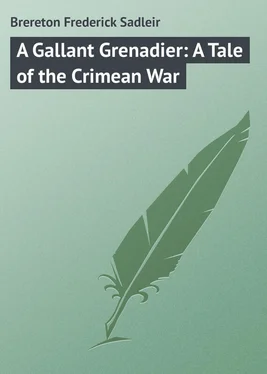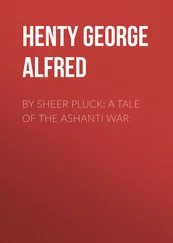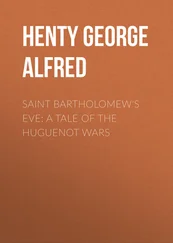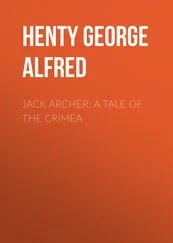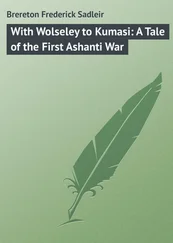Frederick Brereton - A Gallant Grenadier - A Tale of the Crimean War
Здесь есть возможность читать онлайн «Frederick Brereton - A Gallant Grenadier - A Tale of the Crimean War» — ознакомительный отрывок электронной книги совершенно бесплатно, а после прочтения отрывка купить полную версию. В некоторых случаях можно слушать аудио, скачать через торрент в формате fb2 и присутствует краткое содержание. Жанр: foreign_prose, foreign_children, на английском языке. Описание произведения, (предисловие) а так же отзывы посетителей доступны на портале библиотеки ЛибКат.
- Название:A Gallant Grenadier: A Tale of the Crimean War
- Автор:
- Жанр:
- Год:неизвестен
- ISBN:нет данных
- Рейтинг книги:5 / 5. Голосов: 1
-
Избранное:Добавить в избранное
- Отзывы:
-
Ваша оценка:
- 100
- 1
- 2
- 3
- 4
- 5
A Gallant Grenadier: A Tale of the Crimean War: краткое содержание, описание и аннотация
Предлагаем к чтению аннотацию, описание, краткое содержание или предисловие (зависит от того, что написал сам автор книги «A Gallant Grenadier: A Tale of the Crimean War»). Если вы не нашли необходимую информацию о книге — напишите в комментариях, мы постараемся отыскать её.
A Gallant Grenadier: A Tale of the Crimean War — читать онлайн ознакомительный отрывок
Ниже представлен текст книги, разбитый по страницам. Система сохранения места последней прочитанной страницы, позволяет с удобством читать онлайн бесплатно книгу «A Gallant Grenadier: A Tale of the Crimean War», без необходимости каждый раз заново искать на чём Вы остановились. Поставьте закладку, и сможете в любой момент перейти на страницу, на которой закончили чтение.
Интервал:
Закладка:
“Wait and see,” answered Phil easily. “We’ve had our joke, and a good one it was, and perhaps we shall have to pay for it.”
Meanwhile Mr Julius Workman had reached the school, and had asked for Mr Ebden. He was shown into the library, and there, as he waited and thought over the matter, his rage, instead of decreasing, grew even more violent, so that when the pleasant-faced little master entered, and in his cheery voice said, “Ah, Mr Workman! this is a pleasure I had not expected,” the stout old gentleman was beyond himself, and could scarcely speak.
“Pleasure, sir! Pleasure!” he spluttered at last. “It’s no pleasure to me, sir; let me tell you that. I have a serious complaint to make. What have you to say, sir?”
He stared at Mr Ebden as though the latter had had a hand in the prank.
“A complaint, Mr Workman? I don’t understand,” said Mr Ebden with astonishment.
“Yes, you do, sir; yes, you do,” the irate old gentleman shouted rudely. “Why don’t you look after your boys? I told you they were a nuisance, and now they’ve played a trick on me and ruined my statue of Hercules.”
When Mr Ebden had heard the full details of the prank he too was extremely angry, or pretended to be so, and at once accompanied Mr Workman to inspect the ruined statue. Then, with a heavy frown on his usually pleasant face, he returned and summoned all the boys before him. Mr Julius Workman was also present, and glowered round at them as though he would like to do everyone some mischief.
“You’ve got to find out who did it, or there’ll be trouble,” he remarked significantly to Mr Ebden, as the latter was about to speak.
Now, the boys at Ebden’s were, naturally, unaware of the peculiar reason their master had for keeping on good terms with “Old Bumble”, but this remark struck them as peculiar, and Phil, thinking it over, and being a quick-witted lad, grasped its meaning, and determined at once to give himself up.
“I’m the biggest fellow here,” he thought, looking round at his companions, “and though I’m not the eldest by some months, I’m usually the leader in these scrapes.”
“Boys,” said Mr Ebden severely, scrutinising each one of them in turn, and speaking slowly and distinctly, “a foolish and most objectionable prank has been played upon one of the statues in the gardens. Mr Workman declares that one of you is guilty. Is this so?”
“Of course it is,” grunted “Old Bumble” angrily. “What’s the good of asking if they did it? Of course they did!”
Mr Ebden took no notice of the interruption, but looked at his pupils, who stared guiltily at one another, knowing well that each had been a party to the plot, and yet waiting for one to give the lead before the others acknowledged.
Phil stepped forward in front of his comrades, and with upright head, and eyes fixed straight on Mr Ebden’s, said:
“Yes, sir, it is so. I tarred and feathered the statue, and I’m sorry Old B – Mr Workman – is so angry.”
“Old B! What did the scamp almost call me?” shouted Mr Workman, working himself into another rage. “You are a scamp, sir, and a disgrace to the school!”
“I am sorry, sir,” Phil said again. “I did it for a joke only, and now I’ll clean the statue if Mr Ebden will allow me.”
But this was out of the question. The boys were dismissed, and a long conversation ensued between Mr Ebden and the irate old gentleman. After that work proceeded as usual, but, knowing that it was Mr Ebden’s invariable rule to allow twenty-four hours to elapse before deciding upon the punishment for any serious offence, Phil did not permit his hopes to rise, or imagine that he was to get off easily.
And, as it turned out, he was right. After mature consideration Mr Ebden summoned the boys, and having read them a lecture, gave Phil the severest caning he had ever experienced in his life, all of which that high-spirited lad bore without so much as a whimper. Then he punished somewhat more mildly the three others who had helped in the prank, and who, not to be behindhand or allow one to suffer for the fault of all, had addressed a note to the headmaster the previous evening confessing their guilt.
“I cannot tell you how annoyed I am,” said Mr Ebden in cold tones, which hurt his pupils far more than the cane. “You have aided and abetted one another in destroying a work of art, and you have deeply offended one with whom it was a matter of policy for me to be on good terms. Those four who did the actual tarring will have to pay for another statue out of their own pockets, and I shall communicate with their parents. Now you may go, and let there be no more of this foolishness.”
Chapter Three.
Out into the World
Letters did not travel so rapidly in the year 1850 as nowadays, and the fact that a week elapsed between the despatch of Mr Ebden’s note and its receipt at the vicarage at Riddington was not a matter to lead to abuse of the postal authorities; for the town in which Mr Western lived was somewhat remote, and well away from the main line, and epistles which were addressed to its residents usually lay for a day or more at a post-office twenty miles away, from which they were removed at most twice a week. However, arrive the letter did at last, and Mr Western, gloomier and more severe if possible than ever, sat in his study reading it for the second time.
“Look at that,” he said icily, tossing it across to Joe, who stood in his favourite position, leaning against the mantel-piece, with his hands beneath the tails of his coat.
“Humph! The young rascal!” Joe exclaimed with a chuckle, as soon as he had glanced through it. “Got himself into trouble, and his master too. Young donkey! Mischievous young donkey, that’s what he is, Edward; and now he won’t have a penny to bless himself with till his share of the statue is paid for.” Then aside to himself he muttered as he helped himself to snuff: “Humph! Must send him a tip. A few shillings are always welcome to a school-boy.”
Mr Western stared gloomily at the fire and kept silent for a minute or more. Then, bringing his hand down heavily upon the table, he exclaimed fretfully: “The boy worries me. What makes him wish to play these pranks? I have done my best, and so has your sister. He has had warning enough, and surely ought to keep out of these troubles. I believe he is wilfully mischievous, yes wilfully mischievous, and a bad boy at heart, and I will have no more to do with him. I will give him one more start, and leave him to make his way in the world as best he can. If he fails then he must look to himself, and thank himself alone for the trouble he has fallen into.”
Joe started and looked uneasily at his brother-in-law.
“Nonsense, Edward! Nonsense!” he said sharply. “I cannot make you out; and, to be perfectly candid, you are as much a mystery to me as the lad seems to be to you. Cannot you understand that he is simply full of spirit, and though, no doubt, he is sorry afterwards for the pranks he plays, yet they are the result of thoughtlessness and an abundance of good health and animal spirits? Bless my life! where would England have been but for lads of his nature? A sunny, cheerful lad he is, and I tell you plainly you do him an injustice when you say he is bad at heart. Look at the letter again. Doesn’t Mr Ebden admit that he owned up like a gentleman? What more do you want? Would you have the boy a girl?”
Joe snorted indignantly, and blew his nose so violently that Mr Western started.
“The misunderstanding is not on my side,” he retorted. “I who have watched him all these years should know; and it is you, Joseph, who have helped to ruin him. You have egged him on, and now, when he should be quiet and steady, he is simply unmanageable. But we will not wrangle about the matter. Philip shall leave Mr Ebden’s house at the end of this term, and shall take a position as clerk in the office of a friend of mine. After that he must look to himself, for I will have no more to do with him.”
Читать дальшеИнтервал:
Закладка:
Похожие книги на «A Gallant Grenadier: A Tale of the Crimean War»
Представляем Вашему вниманию похожие книги на «A Gallant Grenadier: A Tale of the Crimean War» списком для выбора. Мы отобрали схожую по названию и смыслу литературу в надежде предоставить читателям больше вариантов отыскать новые, интересные, ещё непрочитанные произведения.
Обсуждение, отзывы о книге «A Gallant Grenadier: A Tale of the Crimean War» и просто собственные мнения читателей. Оставьте ваши комментарии, напишите, что Вы думаете о произведении, его смысле или главных героях. Укажите что конкретно понравилось, а что нет, и почему Вы так считаете.
